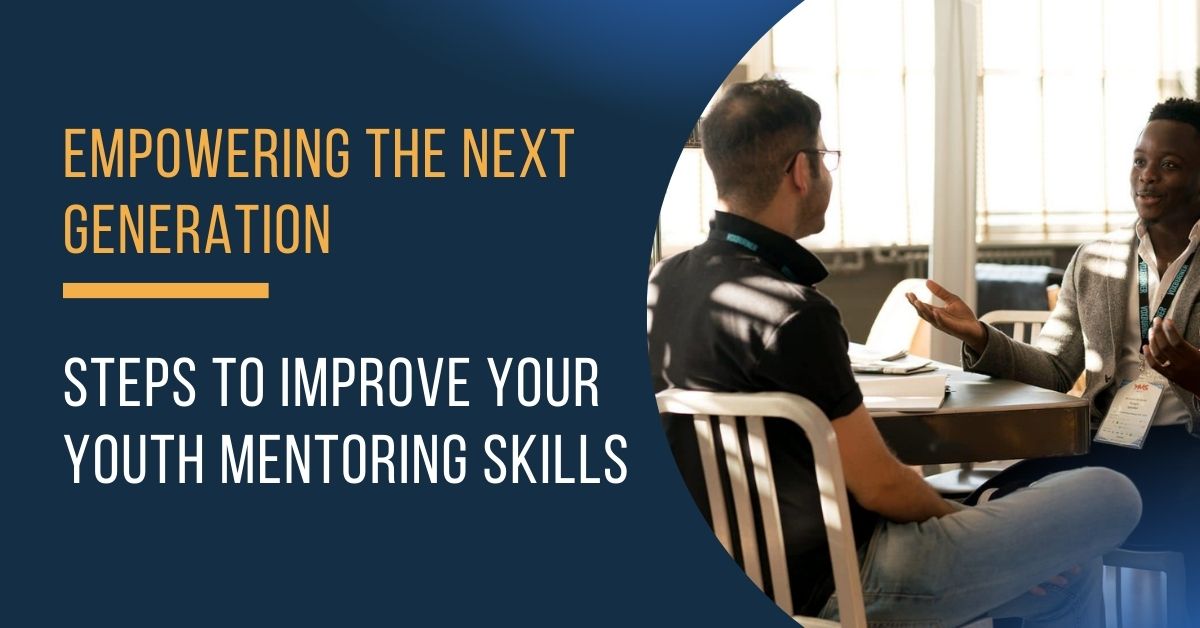Empowering the Next Generation: Steps to Improve Your Youth Mentoring Skills
October 21, 2024
Mentoring the next generation is a noble and impactful endeavor, requiring a blend of wisdom, patience, and adaptability. The influence that mentors have on young people can shape their futures and instill values that last a lifetime. However, effective mentoring is not a one-size-fits-all approach; it demands a nuanced understanding of both the mentee’s needs and the mentor’s capabilities. This article outlines essential steps to enhance your youth mentoring skills, providing a roadmap to become a more effective and inspiring mentor.
Understanding the Role of a Mentor
Before diving into the steps for improving mentoring skills, it’s crucial to understand the role of a mentor. A mentor is not merely a guide but a supportive figure who helps a young person navigate their personal, educational, or professional journey. The relationship is typically characterized by trust, respect, and open communication. Effective mentoring goes beyond offering advice; it involves actively listening, providing constructive feedback, and fostering an environment where the mentee feels valued and empowered.
1. Develop Self-Awareness and Reflective Practice
To be an effective mentor, you must first understand your strengths, weaknesses, and biases. Self-awareness allows you to recognize how your personal experiences and values influence your mentoring style. Reflective practice involves regularly assessing your interactions with your mentee, considering what worked well and what could be improved. This ongoing process of reflection and self-assessment helps you adapt your approach to better meet the needs of your mentee.
How to Develop Self-Awareness
- Seek Feedback: Regularly ask for feedback from your mentee and colleagues to gain insights into your mentoring style.
- Journaling: Maintain a journal to document your mentoring experiences, reflecting on what strategies were successful and what challenges you encountered.
- Professional Development: Attend workshops or training sessions focused on self-awareness and emotional intelligence.
2. Build Strong Relationships Through Effective Communication
Strong relationships form the foundation of successful mentoring. Effective communication is key to building trust and understanding. This involves not only speaking clearly and empathetically but also actively listening to your mentee.
Strategies for Effective Communication
- Active Listening: Practice active listening by giving your full attention to the mentee, acknowledging their feelings, and responding thoughtfully.
- Open-Ended Questions: Use open-ended questions to encourage your mentee to share more about their thoughts and feelings.
- Non-Verbal Cues: Pay attention to non-verbal signals, such as body language and facial expressions, to better understand your mentee’s emotions and reactions.
3. Set Clear Goals and Expectations

Setting clear goals and expectations is essential for a productive mentoring relationship. Goals provide direction and a sense of purpose, while clear expectations help prevent misunderstandings and ensure both parties are aligned.
How to Set Goals and Expectations
- Collaborative Goal Setting: Work with your mentee to set specific, measurable, achievable, relevant, and time-bound (SMART) goals.
- Document Agreements: Write down the goals and expectations to serve as a reference and track progress.
- Regular Check-Ins: Schedule regular meetings to review progress, adjust goals as needed, and address any concerns.
4. Foster Independence and Self-Efficacy
A key objective of mentoring is to empower your mentee to become self-sufficient and confident in their abilities. Encouraging independence and fostering self-efficacy helps your mentee take ownership of their development and build resilience.
Ways to Foster Independence
- Encourage Decision-Making: Allow your mentee to make decisions and face challenges, providing guidance rather than solutions.
- Promote Problem-Solving Skills: Help your mentee develop problem-solving skills by discussing various approaches to overcoming obstacles.
- Build Confidence: Recognize and celebrate your mentee’s achievements to build their confidence and motivation.
5. Adapt to Individual Needs and Learning Styles
Every mentee is unique, with different learning styles, needs, and personalities. Adapting your mentoring approach to fit the individual characteristics of your mentee is crucial for effective support.
How to Adapt Your Approach:
- Identify Learning Styles: Determine your mentee’s preferred learning style—whether visual, auditory, kinesthetic or a combination—and tailor your methods accordingly.
- Personalize Support: Customize your mentoring approach based on your mentee’s strengths, interests, and areas for growth.
- Be Flexible: Be willing to adjust your strategies as your mentee’s needs evolve over time.
6. Provide Constructive Feedback and Support

Providing constructive feedback is essential for helping your mentee grow and improve. Effective feedback is specific, actionable, and delivered in a supportive manner.
Best Practices for Giving Feedback
- Be Specific: Offer clear and detailed feedback on what the mentee did well and what areas need improvement.
- Focus on Behavior, Not Personality: Address specific behaviors rather than making personal judgments to avoid demotivating the mentee.
- Encourage Growth: Frame feedback in a way that encourages learning and development, highlighting potential solutions and next steps.
7. Cultivate Emotional Intelligence
Emotional intelligence (EI) plays a significant role in effective mentoring. It involves understanding and managing your own emotions, as well as empathizing with and responding to the emotions of others.
Developing Emotional Intelligence
- Self-Regulation: Practice managing your own emotions and reactions, especially in challenging situations.
- Empathy: Develop the ability to empathize with your mentee’s feelings and perspectives.
- Social Skills: Enhance your interpersonal skills to build rapport and handle conflicts constructively.
8. Stay Informed and Continuously Learn
The field of youth development and mentoring is constantly evolving. Staying informed about new research, methodologies, and best practices ensures that you provide the most relevant and effective support.
How to Stay Informed
- Professional Development: Engage in ongoing training and education related to mentoring and youth development.
- Read Widely: Keep up with current literature, articles, and studies on mentoring and related topics.
- Network with Other Mentors: Join mentoring networks or organizations to exchange ideas and learn from the experiences of others.
Conclusion
Empowering the next generation through mentoring is a profound responsibility that requires a commitment to personal growth, effective communication, and adaptability. By developing self-awareness, building strong relationships, setting clear goals, fostering independence, adapting to individual needs, providing constructive feedback, cultivating emotional intelligence, and staying informed, you can enhance your mentoring skills and make a lasting impact on the lives of young people. Remember, the ultimate goal of mentoring is to guide and support, helping mentees to realize their full potential and navigate their paths with confidence and resilience. Through continuous improvement and dedication, you can become a transformative mentor and contribute meaningfully to the development of the next generation.

